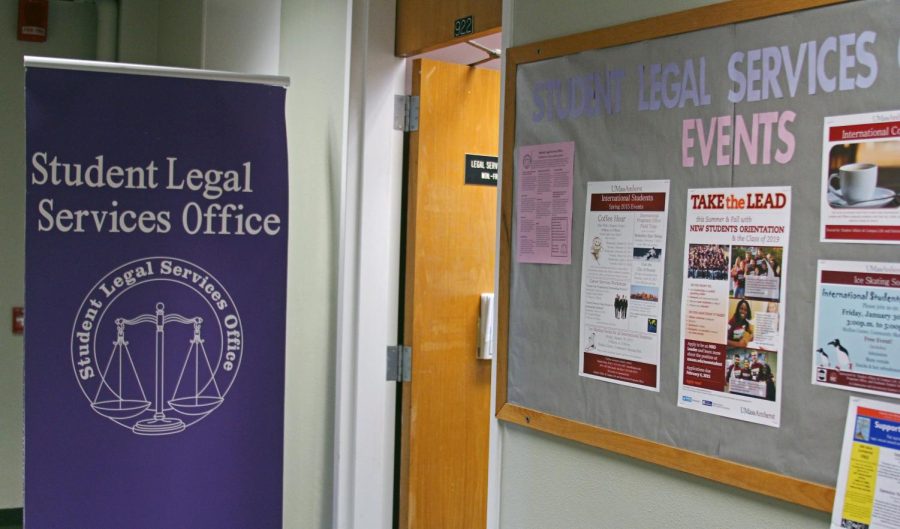On Dec. 15, the Board of Trustees of the University of Massachusetts will vote on whether to renew litigation authority for the Student Legal Services Office at UMass Amherst.
Litigation authority, re-authorized every 10 years, allows the SLSO to go to court, attend tribunals and file petitions on behalf of students.
The Board of Trustees bestows litigation authority upon the SLSO with certain limitations. The office cannot, “sue the university or any of its employees in their official capacities [and] we can’t sue or be involved in litigation against the Commonwealth or any of its subsidiaries,” said Bernadette Stark, director of the SLSO.
The SLSO offers a diverse range of services beyond just legal advice to UMass students.
“They also represent students in cases regarding housing, immigration, visa consequences and family cases,” said Afra Rindani, attorney general of the Student Government Association (SGA).
While the attorneys on staff are unable to represent students in most criminal cases, they can advise on these issues and refer students to local attorneys. The office also provides legal counsel to student groups, such as SGA and Graduate Student Senate.
Litigation authority is a crucial component in many of the services and resources that are offered to students. If the office does not have litigation authority, they would largely be unable to represent their clients, UMass students, in court and file certain administrative paperwork, such as petitions, on their behalf.
“It also limits our ability to send demand letters to landlords,” Stark said. “A landlord is not going to pay attention to a lawyer that is sending them a letter that says, ‘fix this or else,’ if they know that the ‘or else’ doesn’t involve them being taken to court.”
This stands to impact especially vulnerable members of the student population, such as those in disputes with their rental agreements and international students needing to file petitions.
The Student Legal Services Office is an independent campus agency, entirely funded by the student activities fee and Graduate Senate tax.
While the office remains a department within UMass that collaborates with the University on programs and administrative issues, their legal work remains entirely independent.
“We are a private law office,” Stark said. “We [must], pursuant to the rules of ethics, maintain confidentiality between us and our clients, the students. We are not required and cannot be compelled to disclose confidential client information to the university.”
For the first time since 2015, the office is fully staffed and equipped to meet demand. With three attorneys on staff, they have provided services to about 460 students in the past 90 days, according to Stark.
Prior to the 2020 school year, after which data collection was disrupted, the SLSO handled an average of 700 to 900 student cases and served hundreds more through educational programs in the community.
The question of litigation authority was initially put to the Board of Trustees in 2020, but because of COVID-19 pandemic disruptions, a formal vote was extended until 2022. The SGA, GSS and other administrators within UMass were overwhelmingly supportive of the continuation of SLSO.
UMass’ Office of the General Counsel, “had questions about how there was a law office on campus that didn’t report back to them. [There] was concern about liability issues … the general counsel has some concerns and a couple of questions about how the office operates, even though they’ve been operating for [almost] fifty years,” Rindani said.
General Counsel Gerry Leone stated via email to Massachusetts Daily Collegian that he could not comment with Board of Trustee decisions still ongoing.
This summer, the SLSO underwent a program review wherein they were evaluated for their organizational practices and resource allocation, according to SGA Vice President Meher Gandhi. The external program reviewers were able to provide recommendations for the SLSO and helped clarify many of the questions that had been raised by General Counsel, Gandhi said.
“I’m cautiously optimistic that it’s going to be resolved by December,” Stark said. “There’s a lot of people showing their support for this issue and this office.” SGA and GSS have been in communication with UMass administration on this issue.
Chancellor Subbaswamy and Vice Chancellor Brandi Hefner LeBlanc have been vocal supporters of maintaining the litigation authority of the SLSO, according to Stark and Rindani.
“We’re kind of…coming towards the end of the issue, in terms of the reauthorization,” Gandhi said. “I really want students to be aware of what the [SLSO] can offer them.”
Throughout its 48-year history, the office has previously had to adapt to limitations on their ability to litigate. In 1986, the Board of Trustees removed the right of the SLSO to represent students against the University.
In 1987, they retracted the SLSO’s litigation authority entirely. It was restored in 1993, with the office still unable to represent students in cases against state agencies and employees.
“There are a lot of ways that we help the university’s goal of helping students graduate and creating this next generation of leaders and teachers and that would really be impacted if we weren’t able to litigate,” Stark said.
Grace Fiori can be reached at [email protected]. Follow her on Twitter @grace_fiori.



















